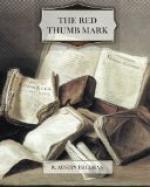“The first witness whom I shall call,” said Sir Hector Trumpler, “is John Hornby.”
Mr. Hornby, looking wild and agitated, stepped into the witness-box, and the usher, having handed him the Testament, sang out—
“The evidence you shall give to the court and jury sworn, between our Sovereign Lord the King and the prisoner at the bar shall be the truth, the whole truth, and nothing but the truth; so help you God!”
Mr. Hornby kissed the Book, and, casting a glance of unutterable misery at his nephew, turned towards the counsel.
“Your name is John Hornby, is it not?” asked Sir Hector.
“It is.”
“And you occupy premises in St. Mary Axe?”
“Yes. I am a dealer in precious metals, but my business consists principally in the assaying of samples of ore and quartz and bars of silver and gold.”
“Do you remember what happened on the ninth of March last?”
“Perfectly. My nephew Reuben—the prisoner—delivered to me a parcel of diamonds which he had received from the purser of the Elmina Castle, to whom I had sent him as my confidential agent. I had intended to deposit the diamonds with my banker, but when the prisoner arrived at my office, the banks were already closed, so I had to put the parcel, for the night, in my own safe. I may say that the prisoner was not in any way responsible for the delay.”
“You are not here to defend the prisoner,” said Sir Hector. “Answer my questions and make no comments, if you please. Was anyone present when you placed the diamonds in the safe?” “No one was present but myself.”
“I did not ask if you were present when you put them in,” said Sir Hector (whereupon the spectators sniggered and the judge smiled indulgently). “What else did you do?”
“I wrote in pencil on a leaf of my pocket memorandum block, ’Handed in by Reuben at 7.3 p.m., 9.3.01,’ and initialled it. Then I tore the leaf from the block and laid it on the parcel, after which I closed the safe and locked it.”
“How soon did you leave the premises after this?”
“Almost immediately. The prisoner was waiting for me in the outer office—”
“Never mind where the prisoner was; confine your answers to what is asked. Did you take the keys with you?”
“Yes.”
“When did you next open the safe?”
“On the following morning at ten o’clock.”
“Was the safe locked or unlocked when you arrived?”
“It was locked. I unlocked it.”
“Did you notice anything unusual about the safe?”
“No.”
“Had the keys left your custody in the interval?”
“No. They were attached to a key-chain, which I always wear.”
“Are there any duplicates of those keys?—the keys of the safe, I mean.”
“No, there are no duplicates.”
“Have the keys ever gone out of your possession?”
“Yes. If I have had to be absent from the office for a considerable time, it has been my custom to hand the keys to one of my nephews, whichever has happened to be in charge at the time.”




